Johann Otto Herpel, a most impressive man
Annie Didcott
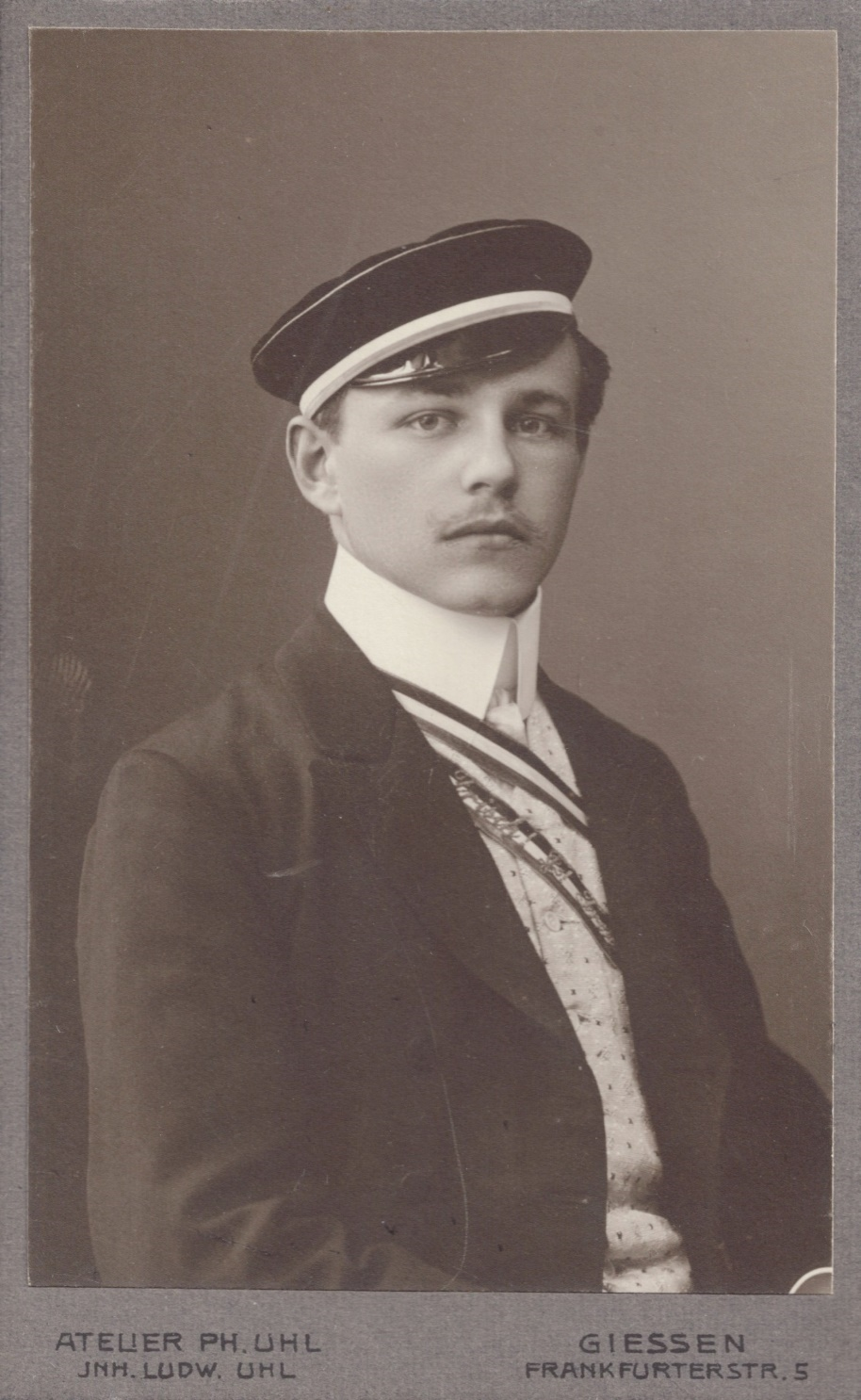
Otto as a theological student at Gießen University, 1916
There must be many families with a remarkable and extra-special member in their midst, a star in their own right, who can rise heroically above the difficulties and tragedies of ordinary life. This story tells of one such person.
Johann Otto Herpel was born in 1886, in the small town of Kelsterbach, which is situated on the river Main not far from Frankfurt, Germany. He was the first child of Peter and Amalie Herpel and his father was a teacher and later a rector. He was followed by seven brother and sisters, of which three died in infancy. When Otto was three years old the family moved to Bickenbach, a small town south of Frankfurt near Darmstadt, where his father had taken a new post in teaching and in 1892 Otto started school. There were two further moves – Auerbach and Bensheim, where in 1896 Otto finished his schooling obtaining his ‘Abitur’, a considerable academic achievement, current to this day in German High Schools.
Otto set out on a career in theology, his family being staunch Lutherans, and studied at a number of elite Universities – Bonn, Gießen, Friedberg, Darmstadt and was finally ordained in Langen. All these towns are not very far from Frankfurt am Main in Germany. Otto’s first professional position was as assistant vicar in Langen where he remained for six months.
Unfortunately Otto was afflicted by chronic nephritis, which had been identified at his medical examination when being checked for the two years’ compulsory military service that all male school-leavers were required to undertake. He was advised then that he would most likely not survive beyond the age of forty. At the time, he was already engaged to be married to Martha Schmeckenbecher so he offered to release her from their engagement, but she would not hear of it.
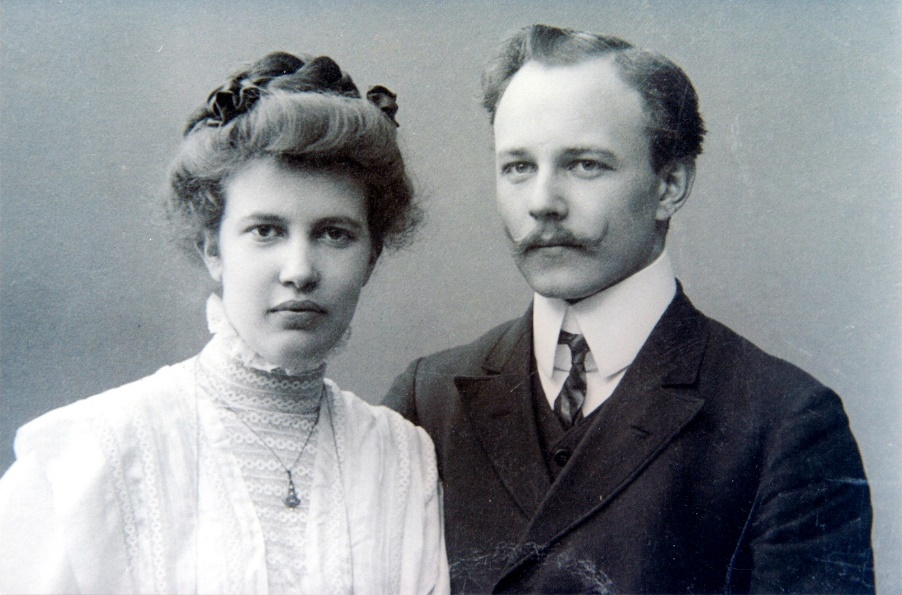
Martha and Otto’s engagement picture, circa 1910
On the 16th June 1911 they were married and went to Darmstadt where for two years Otto worked as an assistant vicar to the Paulusgemeinde and also served as chaplain for the prison.
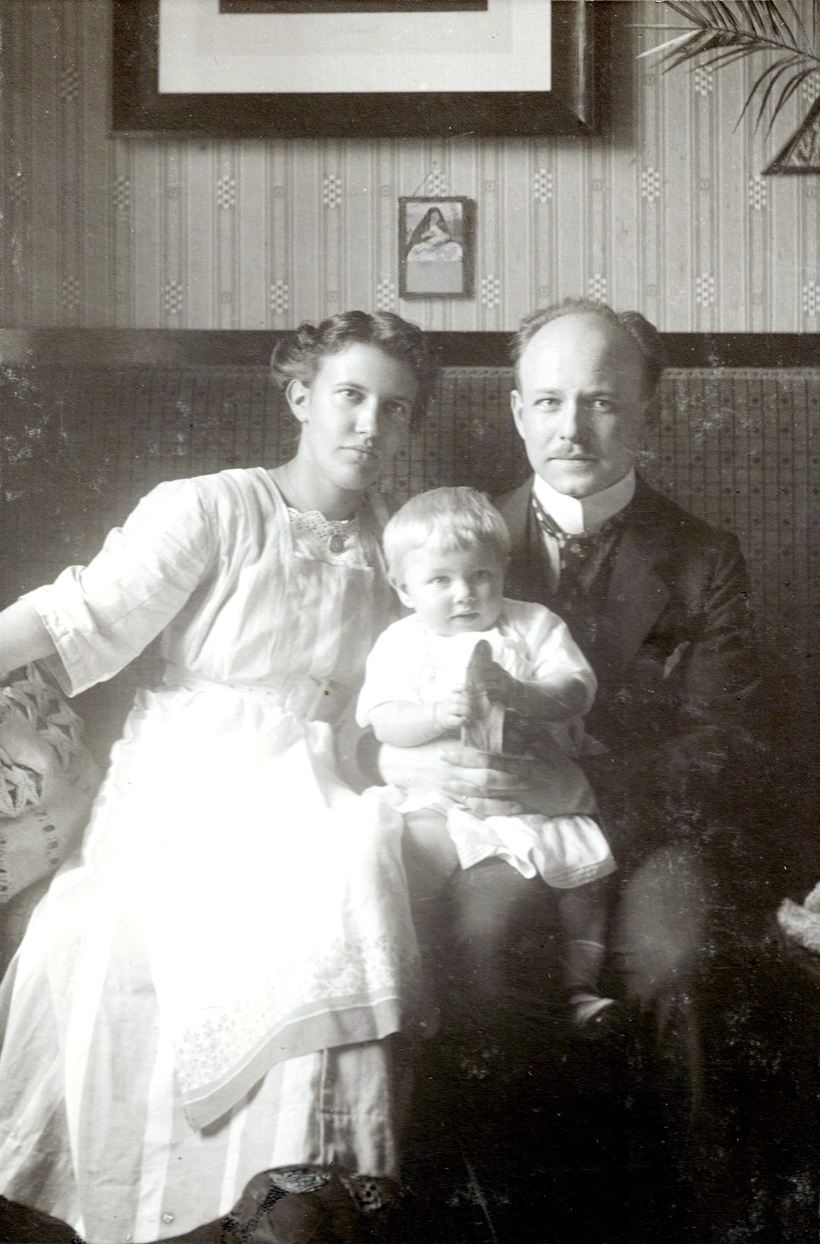
Otto with Martha and Ruth as a one year old
On 12th August 1912, their first daughter was born – Katarina, Bertha, Martha, Johanna, Ruth! The first four names were after her Godmothers and Ruth was her personal name, by which she was known all her life.
The position in Darmstadt was very onerous and Otto was not a very strong man, so when Ruth was 1 year old they found a less demanding position in the medieval village of Lißberg.
Lißberg was a small village with about 300 inhabitants when Otto was sent there in 1913 to be minister of the Evangelical Lutheran Church that had been built in 1618.
Otto was a very learned man and whilst in Lißberg he honed his skill as a writer. He published his inaugural dissertation in 1915 and became a doctor of theology of the University of Gießen .
In 1915 he wrote an essay ‘Das Leben in alten Lißberg’ [Life in old Lissberg] a history of the nineteenth century.
In 1916 he published ‘Das Dorf auf dem Hügel – Wie es den Krieg erlebte’ [The Village on the Hill – How it experienced the war] (Herpel, 1916), in both soft and hard cover, in the German Gothic script and dedicated to Frau Martha (his wife). This is the book for which he is best remembered. It has been published several times, the latest in modern script in 1996 .
Also in 1916, on the 2nd February, Ursula Agnes Elizabeth was born. She now lives in the US and will soon be celebrating her 101 years of action-packed life!
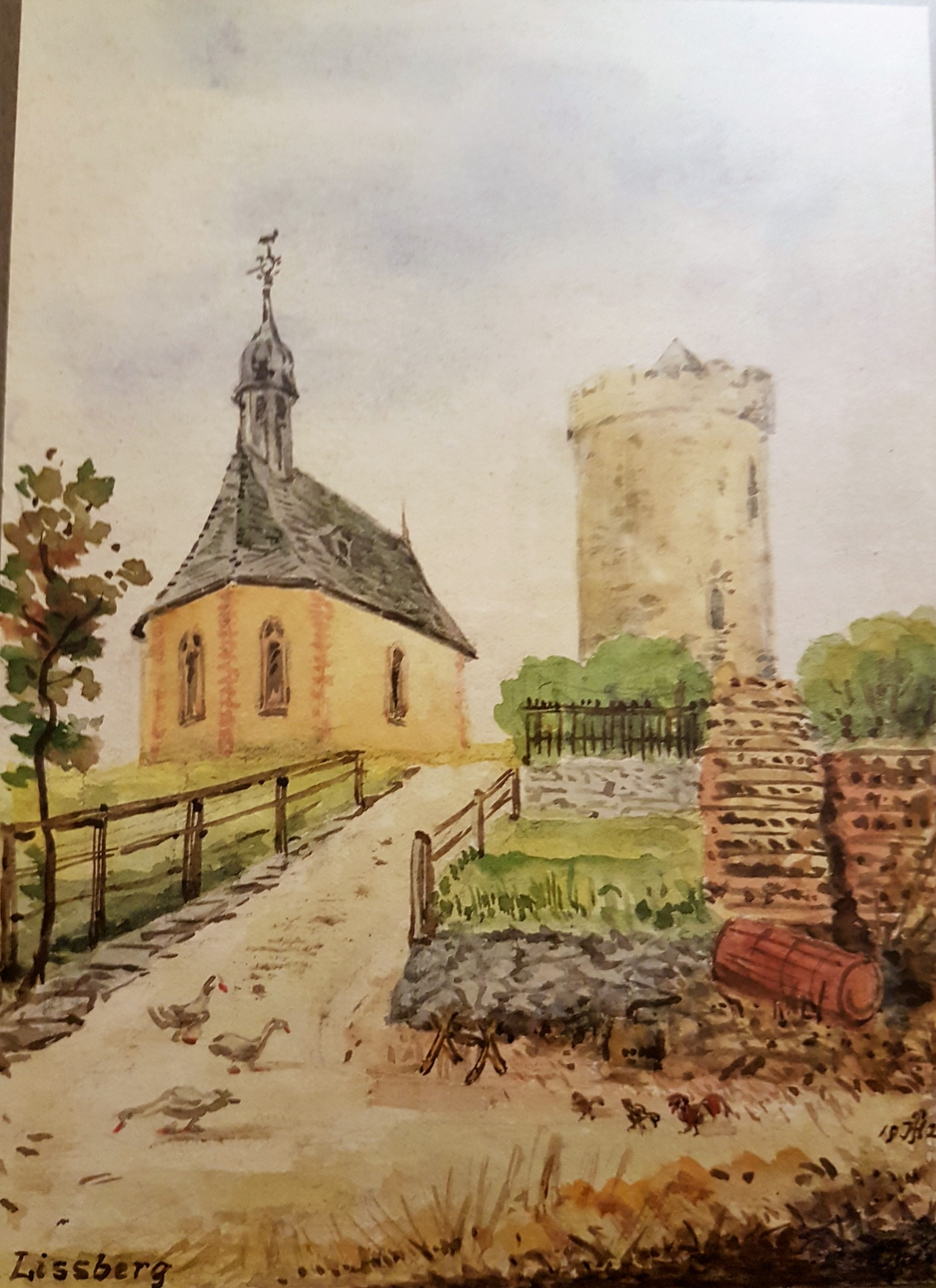
Lißberg Church and Tower
Watercolour, 1920 – Artist Unknown
1917 saw Otto, no mean poet himself, publishing ‘Die Frömmigkeit der deutschen Kriegslyrik’ – [The pious innocence of German war poetry], a quite remarkable book collecting and presenting the sensitivities of poetry relating to the war. This book is the third in a series looking at studies addressing practical theology. I have an original copy with its thick blue, slightly battered, paper cover and its cut pages; it is dedicated to Otto’s parents (Herpel, 1917).
A new departure for Otto, he published in 1918 a small volume of five short stories in a book titled ‘Die Übermacht’ – [Superior Strength] (Herpel, 1918).
Otto Herpel left an impression with the Lißberg villagers that he was an extraordinary and intelligent and brilliant man. People still talk about him after all this time and he is still remembered.
Then in September 1917 things took a turn for the worse. Otto was commanded to take up the position of war chaplain to the army in Metz in Poland. Seemingly the powers-that-be felt that he was not supportive of the war and this was coming through in his work – probably considered to be affecting the morale of his contacts. During his time in Metz, Otto experienced at first hand the grim horrors of warfare and the dreadful pain, the anguish and sheer misery of the wounded. This affected him so deeply that he was not able to maintain a positive appearance. His pacifist approach could not be tolerated by officialdom and he was posted East to the Province of Posen, presumably where he could do less damage!
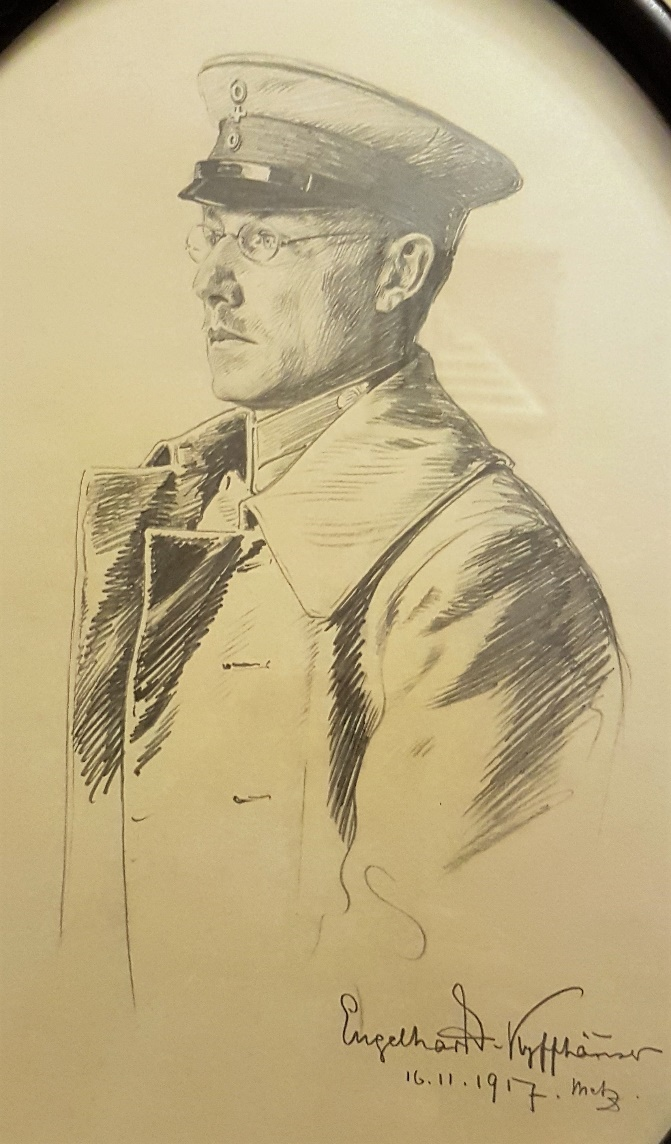
War Chaplain in Metz, Poland, 1917-1918
His daughter Ruth takes up the story:
My father was six months at the Western Front and was then sent to the East (because of his social-democratic ideas, as I heard later). He was stationed in Hohensalza – Inovratzla, which was Prussian at the time. Things there seemed peaceful, the Russian Front a long way off, so my mother, my sister Ursula and I, then two and a half and six years old, followed and lived in a furnished flat in the town. Being six, I also went to a primary school there.
We stayed about six months but then the revolution broke out. I can only remember things in snatches. School was closed. We kept away from the windows because there was shooting in the streets and we did not light any gas lamps. It was near Xmas and dark and cold. Father decided that we must make an attempt to get away, back into Germany.
Xmas Eve found us sitting in a huge railway station waiting room, filled with grey uniformed soldiers, all having got away from the front, and waiting to go home. My father in his grey Army chaplain's uniform and peaked hat, was investigating trains, but had failed to get us onto any. Meanwhile my sister Ursula, now nearly three, sat on my mother's lap, fair hair falling all over her shoulders and singing Christmas carols. It was Christmas Eve! I was very astonished to see the soldiers around us openly cry – men with beards, unkempt, tired, dirty, and tears streaming down their faces.
Then my father turned up and announced that we had to get into the next train or we'd never make it. So we stood squashed on the platform and when the empty train arrived everybody tried to get in. We got into one of the compartments with wooden seats, where there are doors at both ends. Mutti had a seat and had Ursula on her lap. I sat on the knees of a soldier next to her. Father was strap hanging over us and as many people as could squashed in, sitting and standing.
Then a big row started outside. The door to the platform was torn open and all the soldiers were ordered out at the point of guns. Somehow our family was still inside when the train began to move. We children had to lie on the benches. Father and Mother crouched on the floor. Heavy-booted men ran along the train and shouted for it to stop. Shots were fired. One went through our compartment, in one window and out the other. But the train went faster and we were on our way. We heard later that the train driver took the risk that the points were set right and just took off. It was the last train out of Inovratzla for several months.
Our luggage arrived six months later, having been given up as lost. The transport firm very wisely had not dispatched it and had waited until things had quietened down and become organised before sending it off.
And so the family managed to get out in the nick of time and Ruth, in her eighties, still remembered so much detail!
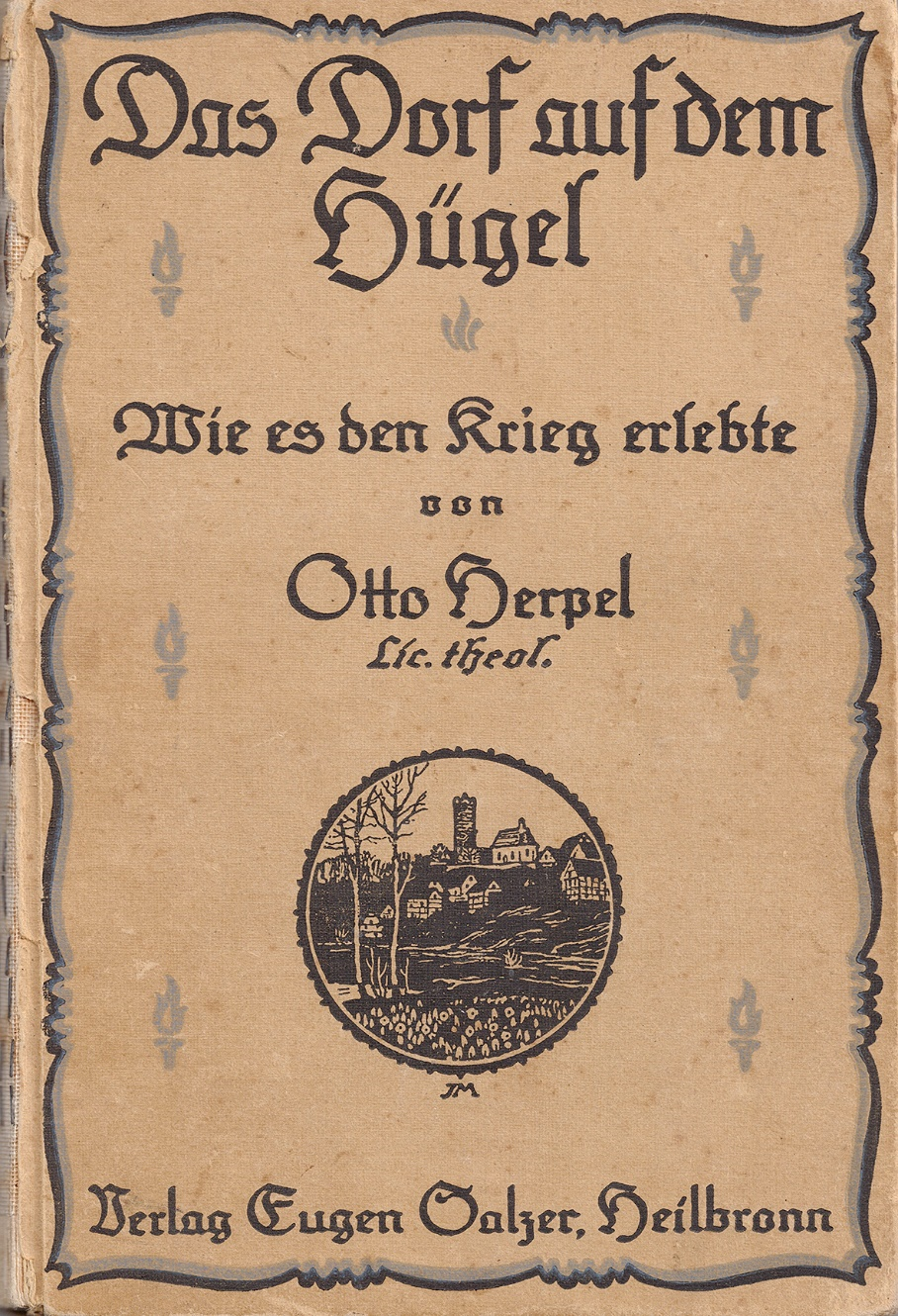
Das Dorf auf dem Hügel
Original edition
Otto the poet
Although he wrote poetry, Otto never had any of his work published and all the originals were lost, most probably during the Second World War. It was not until the death of his daughter Ruth in 2001, here in Australia, that family members, sorting through her books, found a very small volume with poems hand-written in Gothic script, which no-one could decipher!
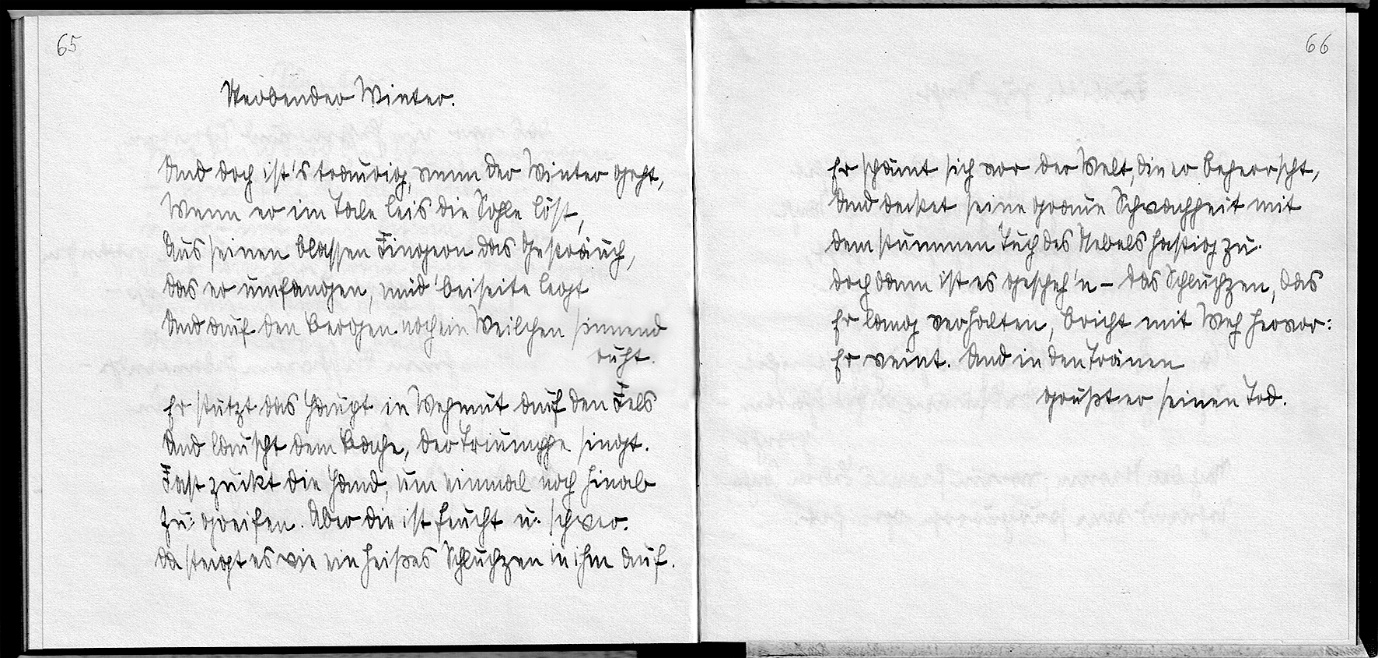
A page from a poem handwritten in gothic script by Otto’s daughter, Ursula
A trip was made to America where Ursula was able to transcribe what she had actually written out by hand in 1937 as a gift to her sister Ruth who was about to leave Germany to go and live in England. And so, in 2004 twenty eight of Otto’s poems were made into a slim volume by his great niece, Helen Ferguson.
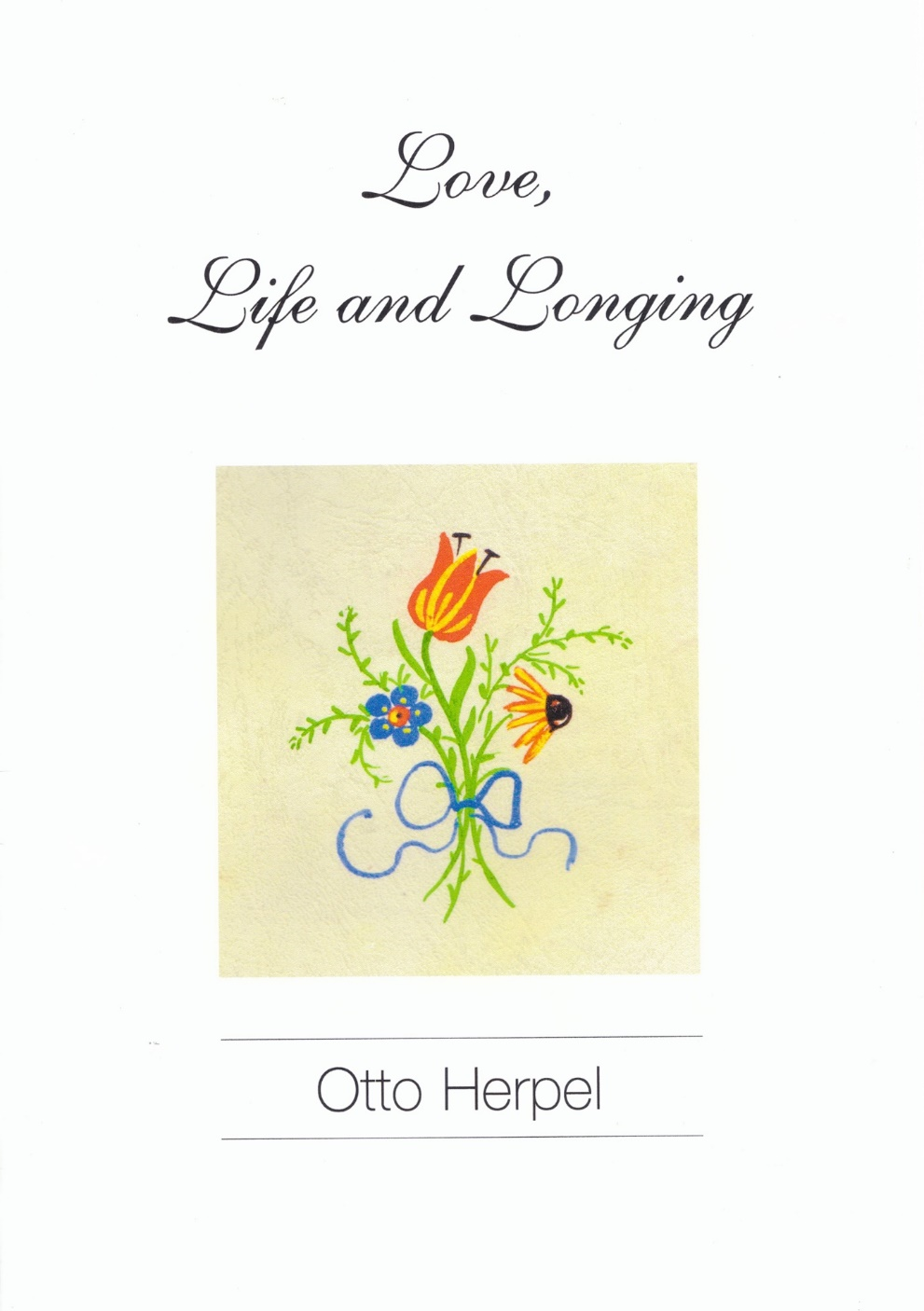
Love, Life and Longing
Otto’s poems published by Helen Ferguson in 2004
My reading of these poems was an eye-opener into the spirit and mind of this man whom I never knew. I worked hard to translate a selection of four of these quite beautiful poems, which were written during the war, when he was often parted from his family owing to the nature of his work as army chaplain.
The poems are presented below with the English translation on the left and the original German text on the right.
The first poem is clearly written for his young wife back at home:
From the Tree in Bloom (number 5)
I want to decorate you, bind all the flowers
Into a garland,
Strew over your head,
Weave into your curls,
All manner of twigs
To be enchanted by you.
I want to sing for you – let all
The songs pour forth
Grasp the jubilation of Spring
Ring out in a thousand tunes,
The sheer passion within me,
In praise of you.
But you are far away! So sadly I give
The beautiful flowers,
Back to Spring;
And my songs – softly, softly
Die for love
And ardent longing.
Vom blühenden Baum (V)
Dich möcht‘ ich schmücken, alle Blumen
Zum Kranze binden,
Auf‘s Haupt Dir streuen,
In Deiner Locken aller Ranken
Zweige winden,
Mich Dein zu freuen.
Dir möcht‘ ich singen, alle Lieder
Erbrausen lassen
In tausend Weisen,
Des Frühlings Jubeln, helles Stürmen
In mich fassen,
Um Dich zu preisen.
Doch Du bist ferne! Drum geb’ dem Lenze
Die Blumen ich trübe
Zurück, die schönen;
Und meine Lieder – stille, stille! –
Sterben in Liebe
Und heißem Sehnen.
The second poem is from a collection relating to night fall:
Songs of the Evening (number 3)
Moss-dark pine trees,
Sound of birds asleep,
A darkening sky
Like a canopy over all.
A questioning longing
Deeply inhaled
Eyes full of tears,
From where I cannot tell.
An old sense of duty
Streaming on downwards
And a new yearning
Pounds through my heart.
Into nameless space
The soul soars upwards,
With God, forest and moss
Woven together as one.
Abendlieder (III)
Moosdunkele Tannen,
Schlafender Vogellaut,
Ein dämmernder Himmel
Darübergebaut.
Ein fragendes Sehnen
Im Atem der Brust,
Die Augen voll Tränen,
Mir selbst nicht bewußt.
Ein altes Sollen
Strömt niederwärts
Und neues Wollen
Durchhämmert das Herz.
In‘s Namenlose
Die Seele schwebt,
Mit Gott, Wald und Moose
In Eines gewebt.
In spite of the war raging around him, Otto clearly never lost his faith in God. I found this next poem spine-chilling:
July Night 1915
Through the night I make my way home.
The moon lights up the way for me.
To the side the stream strides along.
A song is calling a greeting from afar,
I cannot recall its name
The song, yet I ought to know it.
It is the song of the bitter
Road which leads to death.
Two soldiers go marching past
And are singing of a comrade.
They are coming away from their homes…
Silently the moon lights up the way.
Julinacht 1915
Durch die Nacht geh’ ich nach Haus.
Mir leuchtet der Mond voraus.
Es schreitet der Bach zur Seite.
Ein Lied grüßt aus der Weite.
Ich weise es nicht zu nennen
Das Lied, doch muß ich's kennen.
Es ist das Lied vom herben
Hingehen um zu sterben,
Vorbei ziehn zwei Soldaten
Und singen vom Kameraden.
Sie kommen von zu Haus . . . .
Stumm leuchtet der Mond voraus.
This fourth poem is one of my favourites. Written in the winter of 1916, it expresses so well the anxiety of war and, again, reflects Otto’s love of God and how this sustains him:
Night Watch
Deep in the shadows the world grows dark.
Above its dark bed
The gleaming chain of stars is
Shattered by the clouds below.
Not a single little soul is keeping reverent watch.
The anxious ring of a bell lifts its wings,
Hovers, trembling over field and hill
Chirping and pleading for the abandoned Watch –
Now see, the Lord has remembered the world.
A comforting star sails on through the night.
Otto Herpel, 12.1.1916.
Nachtwache
Tief im Schatten düstert die Welt.
Über ihrem dunklen Bette
Ist der Sterne leuchtende Kette
Unter den Wolken zerschellt.
Kein Seelchen fromme Wache hält,
Ein ängstlich Läuten hebt die Flügel,
Schwebt zitternd über Feld und Hügel
Zirpt bettelnd nach der verlassenen Wacht.–
Da hat der Herrgott der Welt gedacht.
Ein Stern fährt tröstend durch die Nacht.
12.1.1916.
After the war
One happy event was the arrival of Ruth’s sister Eva who was born on the 14th of November in 1919. She was baptised Dorothea Ida Emmy Eva.
Once back in Lißberg, Otto found it very difficult to settle into his old routine. Some profound changes had occurred for him and he turned towards political action, combining this with many very fundamental questions about Christianity.
By 1919 he had become very involved with a movement known as ‘The Neuwerk’ and was practically the founder of this Movement – ‘he was the intellectual who gave the bones to it’. His agenda was pacifism, internationalism and socialism which is what he believed in, but it took a while until he reached these ideals.
Otto believed that his vocation was to enter politics and do something for the greater Good. However this period of his life was fraught with dissention, frequent conferences, rejection, changes of heart between colleagues and debates with contentious thinkers. All this would have been some reflection of how society in general had been shaken up by the recent war.
By 1922 he decided to leave the ministry and took up a teaching position at a High School for Girls in Offenbach am Main, teaching theology, philosophy, art history and Greek.
From this time, until his death on his 39th birthday in April 1925, he and his wife Martha devoted a great deal of energy to working actively with young people, participating in the growth of the Wandervögel, an informal movement of wandering youth known as the "birds of passage.” Otto was a foundation member of the Youth Hostels Association, which exists to this day but not in the same spirit as he and his colleagues had envisioned.
Throughout all, Otto continued to write articles, anthologies and frequently contributed to diverse journals. He said already in 1924 that Hitler was mad – he prophesied this and warned of Hitler’s ‘pathologically affected brain material’! He also maintained that Germany would only have a future in a combined united Europe. Otto Herpel was far in advance of his time and would have never survived the Third Empire (Hitler).
His funeral was organised by the young people whom he had inspired, with numerous oral tributes and songs. As Otto Herpel was lowered into his grave, a large ring of brightly coloured flags was lowered to the ground, a moving tribute to a unique man, so dearly loved by the many who knew him.
A personal note
This is the story of the grandfather that I never did know. He died as the result of meningitis when my mother, Ruth, was twelve years old. I only met Martha (‘Mutti’) my grandmother, for the first time at the age of 11, but we instantly formed a strong bond of affection and I visited her in Germany regularly thereafter. All I knew about Otto was through her and my mother’s stories, my sister’s Family History and now, through having made a close study of some of his poetry. I also made frequent references to the Internet, which to my surprise and pleasure has a great deal of information about Pfarrer Otto Herpel.
Someone should write a book about his life!
Acknowledgements
First and foremost I owe my sister Sue Gibson a huge debt of gratitude for all the information she was able to provide from our Family History which she has been working on for very many years. And all the lovely photos.
Many thanks also to Johanna McBride and to Barbara Neu for working with me on the poems, especially those mysteriously elusive meanings. Johanna and I both got totally stuck over one word, so that poem had to be abandoned!








